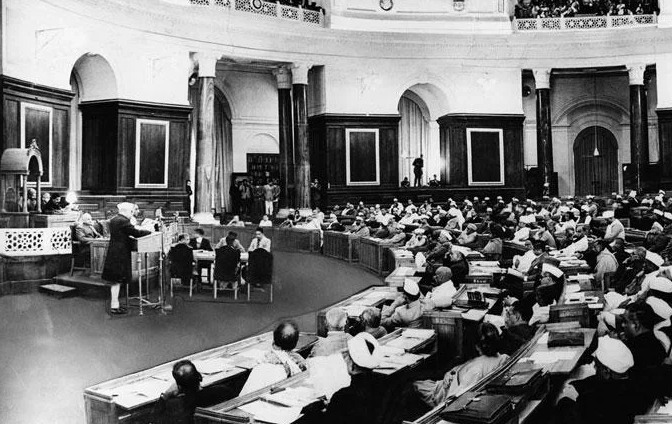An Appeal to MPs: Reflecting on the Vision of the Constituent Assembly (GS Paper 2, Polity)

Context
- The Constitution of India opens with a powerful declaration: "We the People of India have solemnly resolved to constitute India into a Democratic Republic."
- This vision, crafted by the framers of the Constitution, highlights the commitment to democracy, equality, and justice.
- However, recent events in Parliament raise important questions about whether our elected representatives are upholding these values.
- In particular, the conduct in Parliament last week, under the shadow of Dr. B.R. Ambedkar’s name, demonstrates a disturbing departure from the ideals of democratic service and mutual respect.
Key Reflections from the Constituent Assembly Debates
The debates of the Constituent Assembly are a treasure trove of insights into the vision that the makers of the Constitution had for Indian democracy. Several key figures articulated the principles that should guide India's democratic journey:
- Purushottam Das Tandon: He believed that democracy must serve all people, without any discrimination.
- Minoo R. Masani: Quoting Mahatma Gandhi, he emphasized that the State must always be subordinate to the people, serving their needs and safeguarding their rights.
- Syama Prasad Mookerjee: Advocated for a united India, where every citizen, irrespective of race, caste, creed, or community, is treated equally.
- Rajendra Prasad: He stressed the importance of respecting diverse opinions to promote unity and understanding among India's vast and varied communities.
Parliamentary Democracy and Its Principles
The framers of India’s Constitution envisioned a parliamentary democracy that would allow for continuous checks and balances on the executive through debates, motions, and questions. Several figures underscored the importance of this system:
- B.R. Ambedkar: Chose the parliamentary system over the presidential system due to its built-in checks on executive power through daily discussions and scrutiny in Parliament.
- S. Radhakrishnan: Highlighted that India is a symphony of diverse elements, and its success lies in gentleness, harmony, and the ability to listen and respect differences.
- Jawaharlal Nehru: Advocated for a governance style based on friendship, cooperation, and goodwill, warning against any form of imposition or authoritarianism in democratic processes.
Current Challenges in Parliamentary Conduct
- Lack of Respect for Democratic Ideals: Recent parliamentary incidents indicate a departure from the principles of mutual respect, where party loyalty seems to take precedence over the fundamental ideals of democracy. The focus has shifted from service to the people to partisan interests.
- Absence of Constructive Debate: Instead of meaningful discussions, parliamentary debates have often turned into discord and chaos, overshadowing the purpose of addressing pressing national challenges. The emphasis on dialogue and cooperation advocated by Dr. Ambedkar is largely ignored, with more focus on rhetoric and slogans.
- Neglect of National Challenges: Critical issues such as poverty, illiteracy, social inequality, and marginalization are often neglected as MPs get caught in partisan politics. These issues, which demand urgent attention, are left unaddressed in the noise of political battles.
Way Forward: Recommendations for MPs
- Accountability and Apologies: MPs should acknowledge the damage done to democratic principles in recent events and apologize to one another and to the nation. This gesture would go a long way in restoring mutual respect and trust within Parliament.
- Reviving Democratic Ideals: MPs need to prioritize respect for opposing views and engage in dialogue instead of discord. The true essence of democratic service lies in serving the people above all else, rather than adhering to narrow party loyalties.
- Following Dr. Ambedkar’s Vision: MPs must heed Dr. Ambedkar’s advice to make concessions to opposing views, fostering cooperation and unity across different groups. This will require moving away from alienating and fear-mongering rhetoric, and embracing understanding and mutual respect.
Conclusion: Fulfilling the Dream of True Democracy
- MPs must remember that Mahatma Gandhi envisioned a true democracy, not a concentration of power.
- The goal should not be the dominance of political parties, but the service of the people.
- By upholding the values enshrined in the Constitution, MPs can contribute to building a brighter, more unified India, where democracy thrives, and every citizen has a voice.
- Let Parliament’s actions reflect the true spirit of our Constitution, and fulfill the expectations of the people of India.


